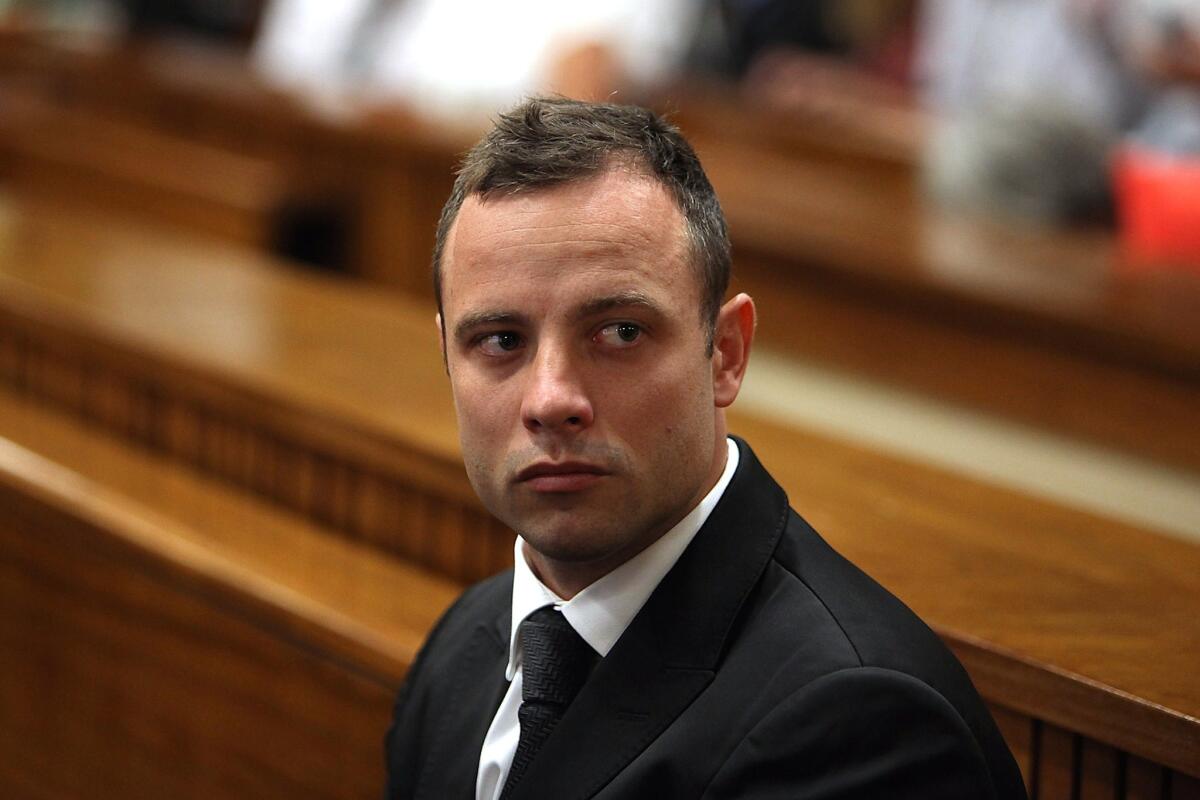Pistorius verdict preview: Judge has number of options

- Share via
Reporting from Johannesburg, South Africa — Thokozile Masipa, the South African judge who has quietly absorbed the evidence in Oscar Pistorius’ murder trial, will deliver her verdict Thursday, in a judgment that could see the Olympic athlete walk free and return to his career, or consigned to life in prison.
Most legal analysts believe the judge will neither convict Pistorius of premeditated murder in the shooting of his girlfriend, Reeva Steenkamp, nor entirely acquit him. There are several possible judgments that fall between the two extremes:
• He could be convicted of non-premeditated murder of Steenkamp.
• He could be convicted of murder on the basis he knew someone was inside the enclosed toilet in his bathroom, and must have known firing four shots would probably kill whoever was inside.
• He could be acquitted of murder, but convicted of negligent unlawful killing, known in South Africa as culpable homicide.
Pistorius has pleaded not guilty to murder and to three lesser charges involving what authorities say are his discharge of a gun in a restaurant and out of a car sunroof while being driven at high speed on a highway and illegal possession of ammunition.
Some analysts predict it could take Masipa more than a day to read the verdict, which may spill over into Friday. South Africa has no jury system and Masipa reached her finding with the help of two assistants, known as assessors.
During the trial, prosecutor Gerrie Nel, often likened to a bull terrier for his ferocious approach to cross-examination, repeatedly told Masipa that Pistorius’ version of events was so unlikely that “it couldn’t be reasonably, possibly true.”
Nel used the phrase for a reason: Under South African law, if the judge is satisfied that Pistorius’ account could reasonably possibly be true – and she is convinced he was legally entitled to fire four bullets into the small cubicle - she would acquit him.
After Pistorius shot Steenkamp in the early hours of Valentine’s Day last year, the news spread swiftly around the globe.
Pistorius, a double amputee who had competed in the 2012 Olympics in London, said he believed an intruder was in the house and that he feared for his life when he fired through the toilet door.
The prosecution claimed that Steenkamp fled Pistorius in terror and locked herself in the toilet when he flew into a rage during a quarrel. It charged him with premeditated murder, arguing the athlete intentionally killed her.
Famous and revered before the shooting, Pistorius had money rolling in from sponsors, and had ordered a McLaren sports car and several large guns. He was also planning to move from his luxury Pretoria home to a house in Johannesburg, where he hoped to live with Steenkamp, according to the defense case.
The athlete was a global symbol of hope, having overcome adversity to compete in the Olympics.
Pistorius had often told journalists that he didn’t consider himself to be disabled. However, much of his defense has rested on the argument that, as an amputee, he felt particularly vulnerable and anxious because he couldn’t escape.
The defense argued that his inability to flee and his anxiety meant that his decision to approach the bathroom, where he believed an intruder to be, was reasonable. The defense also contended that firing four times was an instinctive impulse for a man with a heightened sense of fear.
Psychiatric evidence presented Pistorius as depressed, highly anxious, fearful, insecure and suffering a sleeping disorder, although a monthlong psychiatric evaluation in the course of the trial found that he didn’t suffer from any mental disability that impaired his ability to distinguish right from wrong.
But Nel, the prosecutor, portrayed Pistorius as insincere, selfish, arrogant, aggressive, reckless with guns and quick to anger.
Nel used the lesser gun charges involving the firing of a gun in a restaurant and out of a car sunroof to paint a picture of a man who loved weapons, didn’t respect the police and was reckless.
Pistorius admitted the gun was in his hand when it went off in the restaurant but denied pulling the trigger despite evidence from a ballistics expert that the gun couldn’t have fired otherwise.
The court heard evidence from neighbors who said they heard a woman screaming and gunshots the night Pistorius shot Steenkamp. But other neighbors claimed they heard only a man screaming and crying for help.
Because Pistorius is the only surviving witness to the killing, his evidence will be of paramount importance to Masipa in reaching her verdict. The athlete was clearly nervous, agitated, tired and stressed in the witness box, contradicting himself on numerous occasions.
At one point Masipa asked the athlete whether the reason he was making so many mistakes was because he was too tired to give evidence.
The trial, in which Pistorius’ frailty was on view for all to see, enthralled global audiences. He wept frequently, describing the killing as a terrible accident, and the court had to be adjourned repeatedly so that he could compose himself.
As evidence of Steenkamp’s injuries, including a gaping head wound, was heard, Pistorius repeatedly retched and vomited.
He told the court that his life was on the line, and that he was “defending for my life.”
His main defense was one of putative self-defense: that he genuinely – but mistakenly – believed his life was in danger and believed his actions in opening fire were reasonable and legal.
His defense lawyer, Barry Roux, told the court that Pistorius and Steenkamp were deeply in love and resolved occasional quarrels quickly. Roux presented hundreds of loving What’s App messages between the pair, though Nel focused on one message in which Steenkamp complained Pistorius sometimes scared her with his angry reactions to her.
Pistorius was a gun enthusiast who spent time at gun ranges. A video shown to the court showed him firing a powerful gun at a watermelon, which exploded. In the video, he described the bullet as a “zombie stopper” as friends laughed uproariously.
In an aggressive confrontation during the trial, Nel told Pistorius that Steenkamp’s head had exploded like the watermelon when he shot her, and demanded that he take responsibility for the killing.
Nel also played on Pistorius’ not guilty pleas to portray the athlete as a man who refused to take responsibility for his actions.
If Pistorius is acquitted of all charges, he will walk free. If not, the court will adjourn for several weeks to allow both sides to make submissions on sentencing, and then Masipa will hand down her sentence.
If convicted of premeditated murder he faces life in jail. A lesser murder conviction could carry a sentence of up to 20 years while culpable homicide carries a term of up to 15 years, depending on the degree of recklessness involved.
Convictions involving the lesser gun and ammunition charges could result in jail time or fines.
Follow @robyndixon on Twitter for news out of Africa
More to Read
Sign up for Essential California
The most important California stories and recommendations in your inbox every morning.
You may occasionally receive promotional content from the Los Angeles Times.













